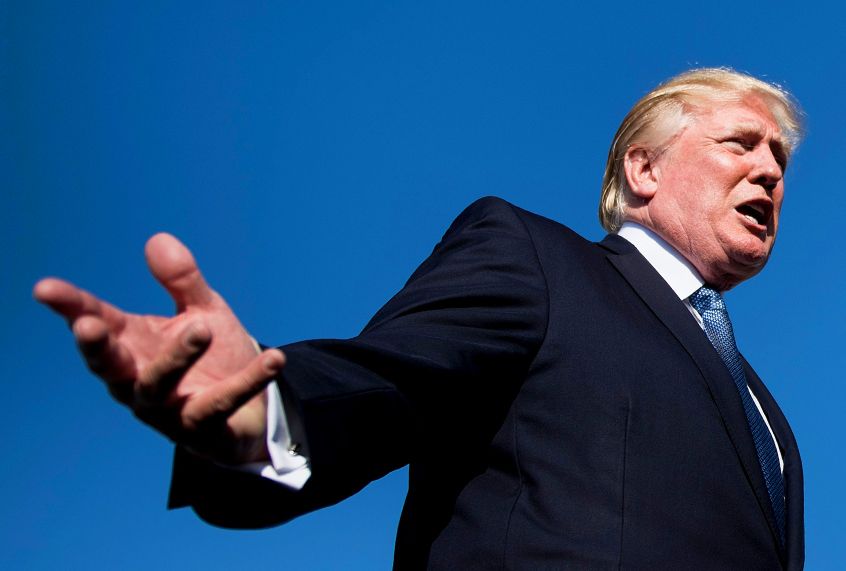With great power comes great responsibility. Those words are a warning. They are also a proclamation. Donald Trump has learned neither of the two lessons.
Last Monday, Justice Department special counsel Robert Mueller issued his first indictments of Trump’s inner circle for financial and other crimes related to the Russia scandal. The next day, Sayfullo Saipov, an alleged ISIS-inspired terrorist, killed eight people and injured at least a dozen more on the streets of lower Manhattan.
In response, Donald Trump concocted a series of lies and conspiracy theories about Hillary Clinton, uranium and the Democratic Party. On Twitter as well as in interviews throughout the week, he said that the American legal system was “a joke” and “a laughingstock.” Trump may also have made it much more difficult to convict or sentence Saipov by publicly threatening him with execution.
Trump seemed affronted at the limitations of his power, telling a radio interviewer, “You know, the saddest thing is that because I’m the president of the United States, I am not supposed to be involved with the Justice Department. . . . I am not supposed to be involved with the FBI. I’m not supposed to be doing the kind of things that I would love to be doing. And I’m very frustrated by it.” He wants the FBI and other law enforcement agencies to imprison his political rivals. In behavior suggesting a malignant form of narcissism, Trump proclaimed that the staff at the State Department does not matter: “The one that matters is me.”
Once again Donald Trump and his administration have shown a reckless disregard for the standing norms and rules of American democracy, sullied the office of the presidency and displayed overt contempt for the concept of an independent judiciary. At almost any other moment in American history, such conduct would be grounds for impeachment. But in the malignant reality that Trump has forced upon the American people, such events have become the new normal. American fascism metastasizes quickly; the unconscionable quickly becomes routine.
By the standards of normal politics and good governance, Donald Trump’s presidency is a spectacular failure. On any future list of American presidents, Trump deserves an asterisk as a mark of ignoble distinction. Moreover, if measured by traditional norms of presidential style and leadership such as temperament, organizational skill, ability to work with Congress, speaking ability, crisis management ability, emotional intelligence, vision and intelligence, Trump ranks among the worst presidents in American history.
Trump’s popularity has sunk to historic lows for a president at this point in his first term, yet he maintains high levels of support among Republicans and his other core supporters. How it is possible that such a political fiend could remain so popular with tens of millions of people in what is supposedly the greatest democracy on Earth?
The more “comforting” explanation points toward the ways American politics is extremely polarized and partisan. Consequently, because Trump is a Republican who is enacting policies that his voters supposedly want (or at least that donors, conservative media and Republican apparatchiks want), there exists a deep reservoir of loyalty and support that will not be shattered. Given the realities of gerrymandering, voter suppression and the peculiarities of our electoral system, as well as the power of the right-wing propaganda machine, this is also why Republicans may well hold a congressional majority in 2018 and why Trump may win the White House again in 2020.
But there is a more troubling way to read this reality: Donald Trump is popular among tens of millions of white Americans precisely because he is rich, ignorant, a bully, violent, misogynistic, racist and crude. In his shortcomings they see admirable virtues which they desire for themselves.
In an earlier conversation with Salon, historian Timothy Snyder warned how the “worst-case scenario” was that “the 25 percent or so of Americans who [are] behind Trump are an impenetrable bloc of unwavering support — and that there is some kind of incident which is much worse than Charlottesville. In the long term, I’m also very worried about an America where civic sensibilities are totally bowled over by the output of lies from the White House.”
One cannot ignore how, in voting for Donald Trump, his supporters made a conscious decision to cause pain and harm to their fellow citizens. In understanding the allure of Trumpism, the pleasures of political sadism and the psychological wages they pay cannot be underestimated. Ultimately, Trump represents the worst aspects of America’s national character distilled down into one human being. Instead of being condemned for this fact, too many millions of Americans view Trump as a hero and defender of their values.
Trump is a symptom. America’s cultural sickness is deep and will not be cured by removing him from office. There is no easy solution for the national malaise and pathos brought about by Trumpism. Much hard work will need to be done to heal American society once Trump finally leaves office. But will the American people be too exhausted and traumatized by that point to actually take on the necessary labors?


